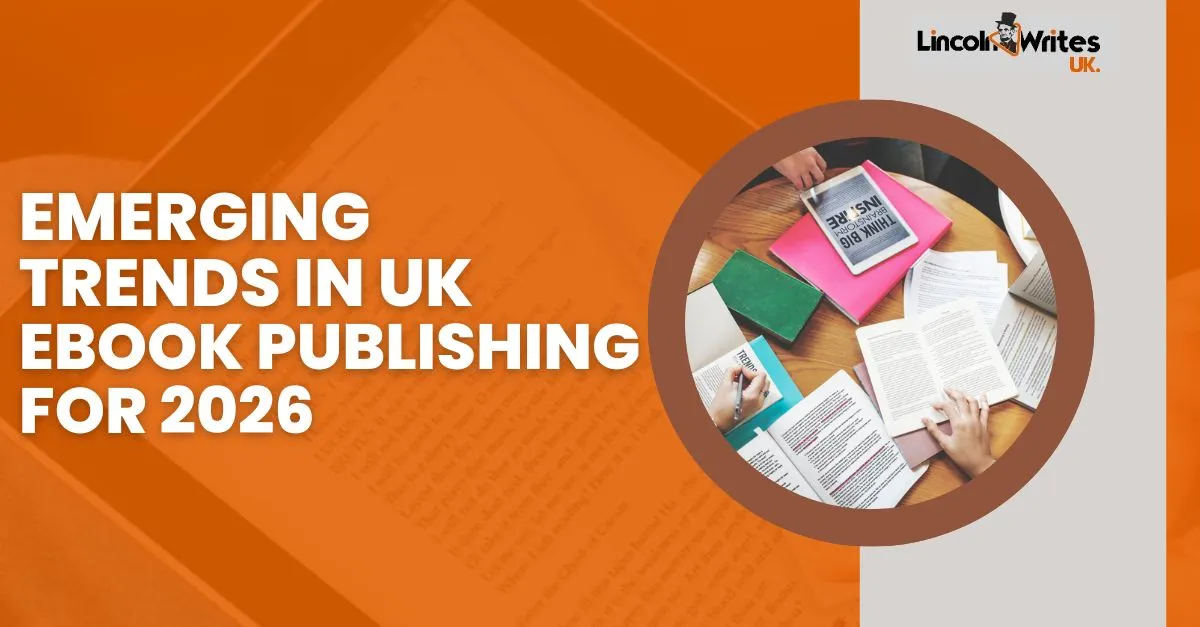The publishing industry has seen a massive shift in consumers as more and more people are enjoying the habit of reading. And all credit to how accessible digital media has made reading. With the ongoing shift happening, it’s crucial for authors who want to make their mark on the world. If you’re one of them, then it’s vital to understand the ebook publishing trends 2026 UK.
This guide explores what’s coming, what’s changing, and how you can adapt, whether you’re self-publishing your first novel, seeking support from trusted ebook publishers UK, or building a career through memoir ghostwriting or business books.
1. AI-Personalised Reading Experiences
Let’s start with the elephant in the room: AI.
AI isn’t just shaping how books are written (we’ll talk about that later); it’s also changing how they’re read. Platforms are beginning to personalise recommendations and reading experiences based on user behaviour, similar to how Netflix or Spotify tailor suggestions.
Expect:
- Dynamic content recommendations within the ebook
- Adaptive font sizes, themes, and formats based on reader preferences
- AI-generated chapter summaries and highlights
Authors will need to consider how their content interacts with these systems. Clean metadata, clear structure, and strategic formatting will be more important than ever.
This is especially vital for anyone looking to choose ebook publisher platforms that are embracing tech-driven enhancements. If your ebook is a formatting nightmare, AI tools won’t serve it up, and readers won’t find it.
2. Rise of Interactive and Multimedia eBooks
The eBook format is evolving beyond static text. In 2026, we’re seeing more books that include:
- Embedded audio and video clips
- Clickable glossaries, maps, and illustrations
- Choose-your-path storytelling
- Author commentary or bonus content
- Smart quizzes and reader feedback loops
This trend is particularly useful in educational and nonfiction publishing, including business leader ghostwriting and how-to guides. It’s also fantastic for children’s literature. If you’re working as or hiring a ghostwriter on tight deadlines for children’s content, integrating visuals and interactivity can elevate your work to a new level.
The key here? Make sure your eBook files are compatible with multimedia formats, and verify that your chosen ebook distribution channels in the UK support interactive content.
3. Subscription Models and Changing Royalty Structures
Another major trend gaining momentum is the subscription-based reading model. Kindle Unlimited, Scribd, Kobo Plus, and newer platforms are offering unlimited reading for a fixed fee.
This shifts the revenue model. Instead of buying the book outright, readers “borrow” it, and authors are paid based on pages read.
What It Means for You:
- Royalties may fluctuate
- Engagement and completion rates matter more
- Shorter, episodic content may perform better
- Discoverability becomes more algorithmic
This is where working with experienced ebook publishers UK can help. They’ll know how to optimise your ebook for these platforms and prepare your content accordingly.
If you’re involved in ghostwritten series planning, this format opens doors. Series perform exceptionally well in subscription models, keeping readers hooked across multiple titles.
4. Stronger Emphasis on Metadata and SEO
In a marketplace driven by discoverability, your blurb and keywords are as important as your opening chapter.
Expect platforms to give more weight to:
- Keyword-rich descriptions
- Niche-specific categories
- Series data and reading order tags
- Author brand consistency
That means you’ll want to make eBook metadata optimisation part of your publishing checklist. You’re not just writing for readers, you’re also writing for algorithms.
Whether your book was self-written or crafted through ghostwriting legal aspects, you’ll need to ensure the metadata reflects your voice, intent, and category.
5. Hybrid Publishing Models Gain Ground
As the line between traditional vs ebook publishing continues to blur, hybrid models are growing in popularity. These offer some of the support of traditional publishing (editing, design, marketing) with the flexibility and rights retention of self-publishing.
For authors, this means:
- Better royalty rates
- Collaborative decision-making
- Quicker publishing timelines
- Paid publishing services, but with transparency and value
Just make sure you’re not being lured into ebook publishing scams disguised as hybrids. Always check the contract, and consider using proofreading checklists or legal help before signing anything.
6. Reader-Centric Design and UX
In 2026, authors need to think beyond “What do I want to say?” and ask “How will this feel for the reader?”
That includes:
- Clean formatting for mobile devices
- Fast load times
- Responsive image layouts
- Accessible design (e.g., for dyslexic readers)
This applies whether you’re writing fantasy fiction or crafting a business book via memoir ghostwriting. Good UX improves engagement and reviews.
Don’t overlook tools like:
- Proofreading symbols to communicate formatting edits
- Proofreading tools 2025 for layout and spelling
- Beta testing via ARC readers
When in doubt, choose the right proofreader to assess how your content feels on multiple screens. Reader experience is everything now.
7. New Marketing Responsibilities for Authors
More platforms are expecting authors to come to the table with a marketing plan in hand. Publishers might still offer ebook publisher marketing support, but authors will need to take the lead on:
- Email marketing
- Social media promotion
- Ads (Amazon, Facebook, BookBub)
- Reviews and influencer outreach
If you’re not comfortable wearing the marketing hat, many authors turn to freelancers or even integrate strategies during early manuscript development. This is particularly helpful when operating on ghostwriter ROI goals, where every word is part of a long-term strategy.
8. Self-Publishing and AI Content Creation
Yes, AI is helping write books now, but that’s not always a bad thing.
More authors are experimenting with AI-generated drafts and outlines. This can dramatically speed up ideation, especially when used under the guidance of a human writer or editor.
But remember:
- AI is not a substitute for voice or storytelling
- The more AI is involved, the more vital proofreading in self-publishing becomes
- If you’re blending AI drafts with professional writing (like business leader ghostwriting), clearly define your expectations and edits
Think of AI as a tool, not a replacement for authenticity.
Key Takeaways for UK Authors
As we move toward 2026, the UK ebook landscape is expanding, diversifying, and becoming more interactive. But you don’t have to chase every trend. Instead, focus on:
- Knowing your audience
- Picking the right platform and model
- Publishing through vetted, transparent ebook publishers in the UK
- Staying in control of your content, rights, and royalties
- Partnering with professionals who understand trends and tools
Final Thoughts
The future of publishing is digital, dynamic, and full of possibilities. By understanding the ebook publishing trends 2026 UK, you can position yourself not just to survive, but thrive.
At Lincoln Writes UK, we help authors navigate this evolving landscape, from AI-enhanced planning to formatting, marketing, and publishing. Whether you’re drafting your memoir, ghostwriting for clients, or ready to scale a series, we’re here to help you make informed, confident decisions.
Don’t just publish. Publish smart. Let’s build your future, one reader at a time.


